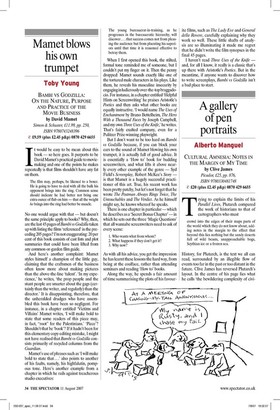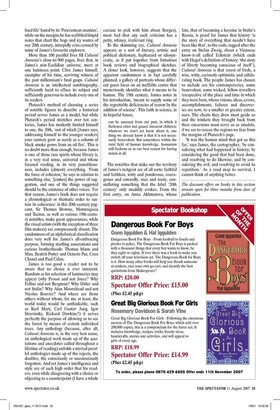A gallery of pen portraits Alberto Manguel CULTURAL AMNESIA: NOTES
IN THE MARGIN OF MY TIME by Clive James Picador, £25, pp. 876, ISBN 9780330481748 © £20 (plus £2.45 p&p) 0870 429 6655 Trying to explain the limits of his Parallel Lives, Plutarch compared the work of historians to that of cartographers who must crowd into the edges of their maps parts of the world which they do not know about, adding notes in the margin to the effect that beyond this lies nothing but the sandy deserts full of wild beasts, unapproachable bogs, Scythian ice or a frozen sea.
History, for Plutarch, is the text we all can read, surrounded by an illegible flow of events too far in the past or too distant in the future. Clive James has reversed Plutarch's layout. In the centre of his page lies what he calls `the bewildering complexity of civi used life' hated by its 'Procrustean enemies', while on the margins he has scribbled limpid notes that chart the bogs and icy wastes of our 20th century, intrepidly criss-crossed by some of James's favourite explorers.
More than 100 parallel lives fill Cultural Amnesia's close-to-900 pages, lives that, in James's non-Euclidian universe, meet at one luminous point: Clive James himself, exemplar of his time, surviving witness of the past millennium's final gasps. Cultural Amnesia is an intellectual autobiography, sufficiently lucid to efface its subject and sufficiently generous to include every one of its readers.
Plutarch's method of choosing a series of notable figures to describe a historical period serves James as a model, but while Plutarch's period stretches over ten centuries, James has modestly limited himself to one, the 20th, 'out of which [James says, addressing himself to the younger readers] your century grew as surely as a column of black smoke grows from an oil fire'. This is no doubt more than enough, because James is one of those rare spirits whose library is, in a very real sense, universal and whose focused reading, in its very punctiliousness, includes (almost) everything. 'From the force of cohesion,' he says in relation to something else, '[comes] the power of suggestion, and one of the things suggested should be the existence of other voices.' For that reason, James's book does not require a chronological or thematic order to sustain its coherence: in this 20th-century pag eant, Sir Thomas Browne, Montesquieu and Tacitus, as well as various 19th-century notables, make guest appearances, while the visual artists (with the exception of three film-makers) are conspicuously absent. The randomness of an alphabetical classification does very well for James's all-embracing purpose, forming startling associations and curious brotherhoods: Thomas Mann and Mao, Beatrix Potter and Octavio Paz, Coco Chanel and Paul Celan.
James is too good a reader not to be aware that no choice is ever innocent. Random as his selection of luminaries may appear (why Proust and not Joyce? Why Fellini and not Bergman? Why Hitler and not Stalin? Why Alan Moorehead and not Nicolas Bouvier? And where are those others without whom, for me at least, the world today would be unthinkable, such as Karl Marx, Carl Gustav Jung, Igor Stravinsky, Richard Dawkins?) it serves perfectly the purpose of allowing us to see the forest by means of certain individual trees. Any anthology (because, after all, Cultural Amnesia is, in the very best sense, an anthological work made up of the quotations and anecdotes culled throughout a lifetime of reading) unfolds a myriad parallel anthologies made up of the rejects, the doubles, the consciously or unconsciously forgotten. And yet James's intelligence and style are of such high order that his readers, even while disagreeing with a choice or objecting to a counterpoint (I have a whole carcase to pick with him about Borges), must feel that any such criticism has a petty, whiney, irrelevant ring.
To the skimming eye, Cultural Amnesia appears as a sort of literary, artistic and political dictionary, haphazard or idiosyncratic, as if put together from fortuitous book reviews and biographical sketches. A closer look, however, suggests that the apparent randomness is in fact carefully planned, a gallery of portraits whose different gazes focus on an ineffable centre that mysteriously identifies what it means to be human. The 19th century, James notes in his introduction, 'meant to supply some of the regrettable deficiencies of reason by the addition of science'. This faith in science, in its hopeful future, can be assessed from our past, in which it flattened cities and gassed innocent children: whatever we don't yet know about it, one thing we already know is that it is not necessarily benevolent. But somewhere within the total field of human knowledge, humanism still beckons us as our best reason for having minds at all.
The notables that stake out the territory of James's zeitgeist are of all sorts: faithful and faithless, witty and ponderous, courageous and cowardly, nice and nasty, constellating something that the label '20th century' only muddily evokes. From the first entry, on Anna Akhmatova, whose fate, that of becoming a heroine in Stalin's Russia, is proof for James that history 'is the story of everything that needn't have been like that', to the coda, tagged after the entry on Stefan Zweig, about a Viennese know-it-all called Eckstein (which ends with Hegel's definition of history: 'the story of liberty becoming conscious of itself'), Cultural Amnesia is that rarest of birds, a wise, witty, curiously optimistic and exhilarating book. The people James has chosen to include are his contemporaries, some benevolent, some wicked, fellow-travellers irrespective of the place and time in which they were born, whose visions, ideas, errors, accomplishments, failures and discoveries are now, to a smaller or greater extent, ours. The charts they drew must guide us and the trinkets they brought back from their excursions must serve us as amulets, if we are to rescue the regions we fear from the margins of Plutarch's page.
'It was the human mind that got us this far,' says James, the cartographer, `by considering what had happened in history; by considering the good that had been done, and resolving to do likewise; and by considering the evil, and resolving to avoid its repetition.' As a road map to survival, I cannot think of anything better.
The discount offers on books in this section remain open for three months from date of publication.










































 Previous page
Previous page